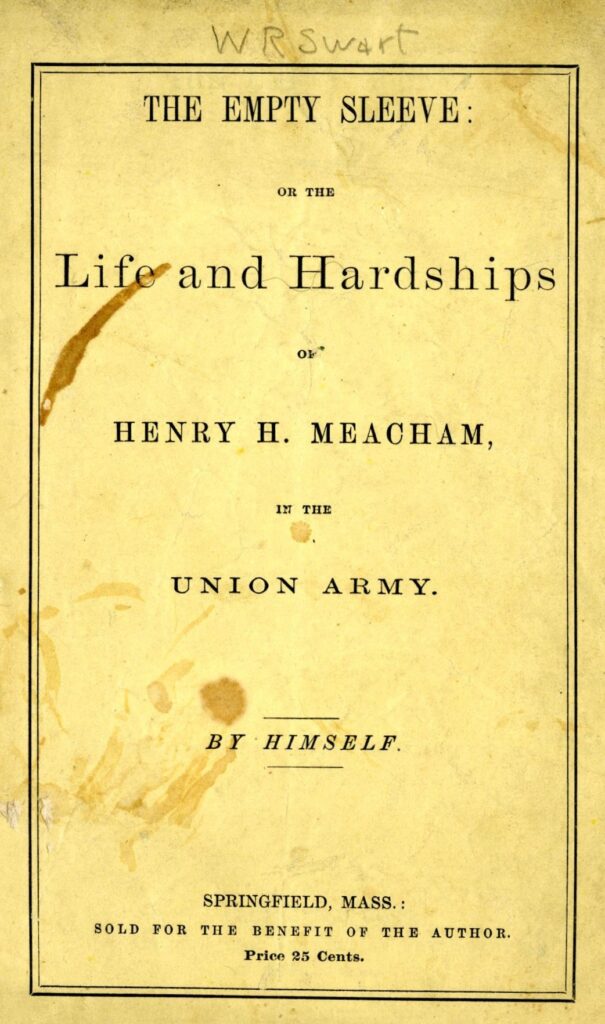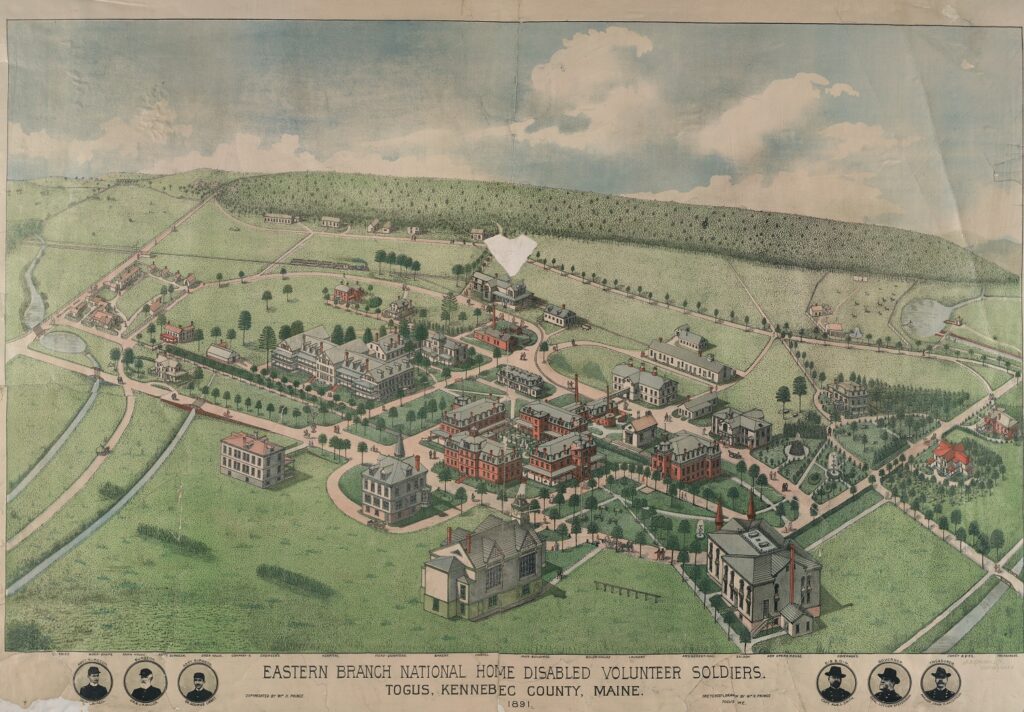Henry H. Meacham, The Empty Sleeve
By Graham Warder, Ph.D., Keene State College
In 1862, when representatives of the United States Sanitary Commission began to consider what to do about soldiers disabled by the Civil War, they did what the organizers of deaf schools, blind schools, and insane asylums had done in previous decades. They traveled to Europe.
Sanitary Commission President Henry H. Bellows dispatched Stephen H. Perkins of Boston across the Atlantic Ocean to investigate European models of how to respond to the disabilities inevitably produced by large-scale warfare. But rather than copying European approaches, Perkins and the Sanitary Commission rejected them.
The United States would not construct large, centrally managed institutions to house those disabled by war nor would the nation allow disabled veterans to rely on begging to survive. According to the report submitted by Perkins, Americans should “restore the large proportion of all our invalids to their homes, there to live and labor according to their strength, sustained and blessed by their own kindred.” Americans should simultaneously “discourage all favor to mendicity.” In other words, disabled soldiers would be cared for in loving homes, supported by generous local communities, and supplemented with adequate disability pensions.
Henry H. Meacham became both a mendicant and an inmate at the massive National Home for Volunteer Soldiers in Togus, Maine. His story suggests the inadequacy of the Sanitary Commission vision.
Meacham was a carriage-maker from Russell, Massachusetts, when war broke out in 1861. He quickly volunteered for service, inspired “by the love of my country,” but was rejected as being physically incapable of enduring the rigors of army life. After his third examination by a doctor, Meacham was finally accepted on July 17, 1863, into the Thirty-Second Regiment Massachusetts Volunteer Infantry.
We know all this because Meacham self-published his story in a pamphlet entitled The Empty Sleeve after the war. It was his way of supplementing what he considered a meager disability pension. In what could be considered a nineteenth-century version of a GoFundMe site, he sold copies of this mendicant narrative for 25 cents, stating, “I throw myself upon the generosity of the public.” The pamphlet makes the case that his disability made him “worthy” of assistance. Worthiness became a common theme in the endless political debates over the increasing cost of Civil War pensions and soldiers’ homes throughout the last third of the nineteenth century.
Meacham’s pamphlet provides a detailed account of his experiences in the Thirty-Second Massachusetts, enduring hard marches and blistered feet, rain and cold, disease and wormy bread. His tale culminated with Meacham’s participation in Ulysses S. Grant’s 1864 bloody campaign in Virginia. Finally, on June 22, 1864, outside Petersburg, a Confederate shell killed five men from his unit and severely wounded his arm, which had to be amputated. Meacham walked a mile seeking medical care, spent time at the City Point Hospital in Washington, D.C., and returned to Springfield, Massachusetts, on September 1, 1864. His narrative concludes with an appeal based on his economic insecurity, his need to care for a wife in poor health, and the inability to survive on the fifteen dollars per month allotted by his disability pension. He also offered, “should war break out again” his other arm, or his life, “to sustain our liberty and independence.”
But Meacham’s own independence was precarious in the years following the war. On December 9, 1871, he was admitted to the Togus National Home for Disabled Volunteer Soldiers. He would stay there until he was discharged on August 27, 1875. By the late 1870s, close to a thousand men were living at Togus.
In 1863, the federal government purchased a former resort at Togus Springs, four miles from Augusta, Maine, for $50,000. By December 1, 1870, the government had spent another $243,300 on improving the property. The various branches of the National Home, the largest of which was in Dayton, Ohio, garnered a great deal of attention because of charges of abuse, immorality, and corruption. The published report of a Congressional investigation of the National Home in 1884 asserted that these institutions were “homes for the country’s defenders, not asylums for the helpless poor.” But the report also suggested a depressing atmosphere of gloom and doom, as well as condescension. The managers of the National Home had to “deal with cripples, rheumatics, epileptics, dyspeptics, men who have been victims of excessive drink, depressed by a sense of advancing age and penury, men of all degrees of mental and moral development, who have no future to look to beyond the grave-yard in sight of the home.”
Meacham would have lived in a dormitory, eaten in a large dining hall, and worked to support the institution and himself. According to its Wikipedia page, Togus maintained “a bakery, a butcher shop, a blacksmith shop, a brickyard, a boot and shoe factory, a carpentry shop, a fire station, a harness shop, a library, a sawmill, a soap works, a store, and an opera house theatre.” Paid employment opportunities abounded.
By all accounts, so did alcohol. We don’t know if Meacham was a problem drinker, but many disabled veterans were. All the National Homes were surrounded by drink purveyors, happy to take veterans’ pensions and earnings. Many veterans were happy to be customers. Some certainly became alcoholics. How much problem drinking was a direct result of traumatic experiences during the war is difficult to gauge, but the conclusion is certainly plausible.
After leaving Togus, Henry H. Meacham did not live very long. He died of pneumonia in Boston on April 21, 1879, at the age of 44. His death record listed his occupation as “Peddler.”
Sources:
Investigation of the Management of the National Home for Disabled Soldiers Volunteer Soldiers, by The Committee of Military Affairs, House of Representatives. Washington, D.C.: Government Printing Office, 1885.
Kelly, Patrick J. Creating a National Home: Building the Veterans’ Welfare State, 1860-1900. Cambridge, MA: Harvard University Press, 1997.
Marten, James. Sing Not War: The Lives of Union & Confederate Veterans in Gilded Age America. Chapel Hill, N.C.: The University of North Carolina Press, 2011.
Meacham, Henry H. The Empty Sleeve: Or the Life and Hardships of Henry H. Meacham in the Union Army. Springfield, Mass., 1869. https://archive.org/details/emptysleeveorlif00meac.
Perkins, Stephen H. Report on the Pension Systems, and Invalid Hospitals of France, Prussia, Austria, Russia, and Italy: With Some Suggestions for the Best Means of Disposing of Our Disabled Soldiers. New York: Wm. C. Bryant & Co., printers, 1863. https://archive.org/details/101525109.nlm.nih.gov.

